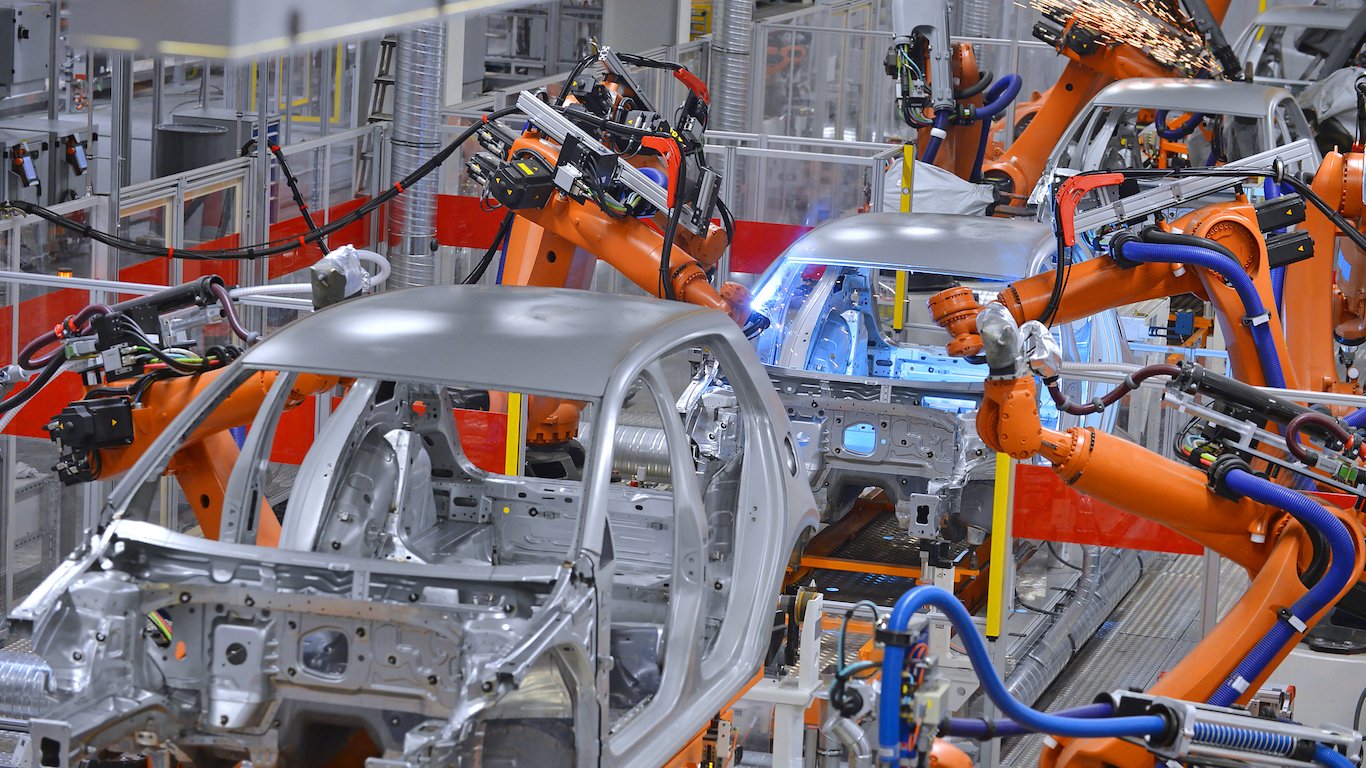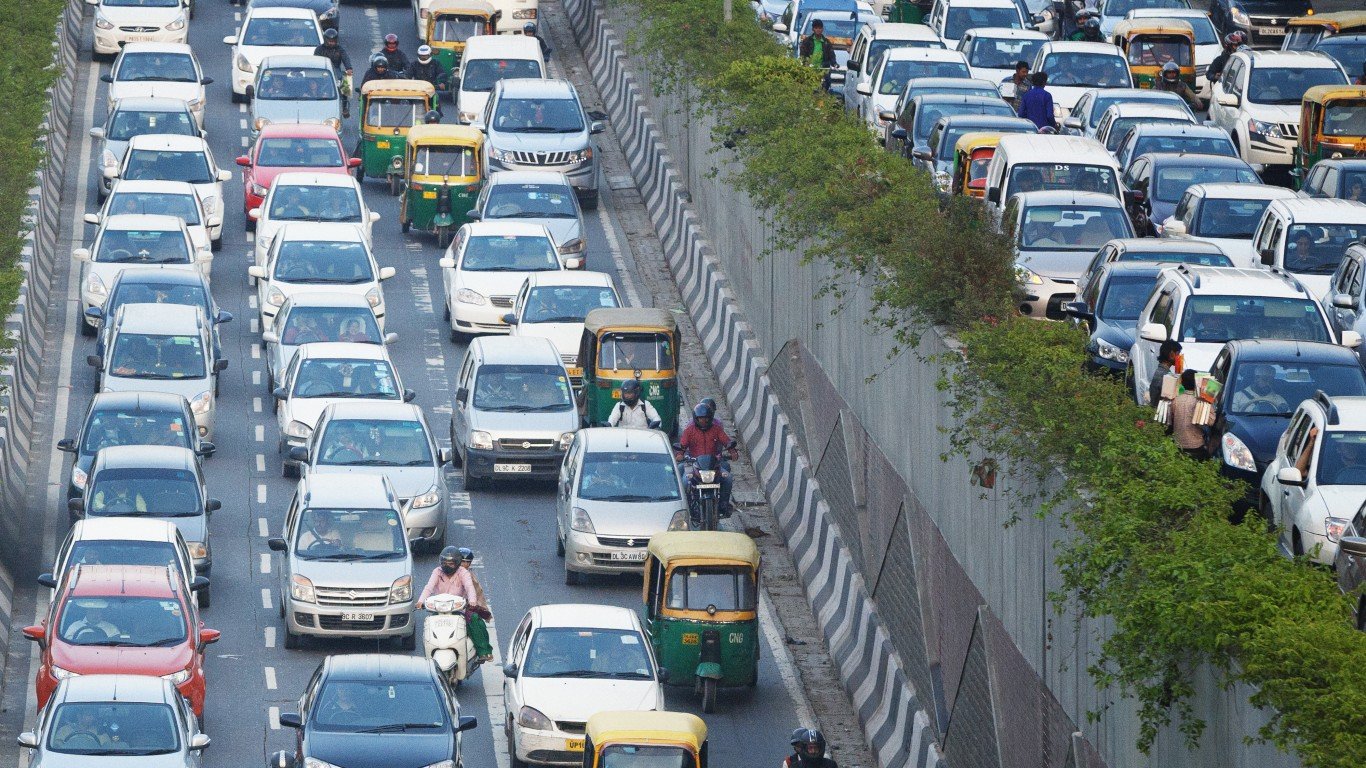

Few experiences are more quintessentially American than jumping into a car, cranking the radio, and driving down an open road. There was a time when that image also meant driving a quintessentially American car, like a Mustang, a Camaro, or a Corvette. These are the most iconic classic American Cars.
American motorists can still do that, but more and more, the cars they are climbing into may be built by a foreign automaker. The United States used to be the world’s biggest carmaker, but America has not held that distinction in decades. Today, we’re not even in the top five. 24/7 Wall St. reviewed the five countries manufacturing more cars than America, using data compiled by the International Organization of Motor Vehicle Manufacturers.
The automobile was developed in Germany and France in the late 19th century, but the vehicle was popularized in America in the early 20th century. Mass-production techniques created by Henry Ford were used to build the Model T that put millions of Americans behind the wheel, and Ford was soon joined by competitors General Motors and Chrysler, forming America’s Big Three carmakers.
American car production peaked at 12.87 million vehicles in 1978, but American dominance has eroded in the following years because of a decline in quality, misreading of the market, and safety concerns. American car prominence was also challenged by the emergence of competitors from Japan and Germany. In 1980, Japan became the world’s leading automaker and was the top manufacturer of cars until China captured the top spot in 2009.
China and India, the world’s two most populous countries, are also two of the biggest carmakers, as rising incomes in those nations have put automobile affordability within reach of millions of people. Automakers in those countries are responding to the transportation trends and demands of car buyers in their countries by building autonomous smart cars that they believe will best serve burgeoning metropolises. Here are the most densely populated cities in the world.
Click here to see the five countries manufacturing more cars than America

5. South Korea
> 2018 car production: 3,661,730 (5.2% of global production)
> 2018 cars + commercial vehicles production: 4,028,834 (7th most)
> Top manufacturers: Hyundai Motor Company, Kia Motors Corporation.
South Korea has been in the top ranks of car-producing countries for at least 20 years. The Hyundai Motor Company, founded in 1967, operates two of the biggest brands, Hyundai and Kia. Sales of South Korean vehicles decelerated in 2018 to 3,661,730 units from 3,735,399 the previous year.
At a forum organized by the Korean Automobile Manufacturers Association in July, panelists raised concerns about the future of the Korean auto industry. They said South Korea was the only nation among the top 10 carmakers to post a production decrease for four straight years. Panelists cited challenges such as higher labor costs relative to rivals Toyota and Volkswagen, a technology-investment gap growing between South Korea and other countries, and a shortfall in workers with the skills needed to build the next generation of vehicles.
[in-text-ad]

4. India
> 2018 car production: 4,064,774 (5.8% of global production)
> 2018 cars + commercial vehicles production: 5,174,645 (4th most)
> Top manufacturers: Maruti Suzuki, Hyundai Motor India, Mahindra & Mahindra
India produced more than 4 million cars in 2018, the fourth most cars in the world. In 1999, India produced just 533,149 vehicles and was the 16th largest producer worldwide.
McKinsey & Company, a management consulting firm, predicts that India will become the world’s third biggest passenger vehicle market in 2021. McKinsey bases its forecasts on how fast India is urbanizing as well as the rapid rise in household incomes in the country. McKinsey predicts there will be 500 million Indians living in cities by 2030. Over the next 15 years, the report estimates that about 200 million people will move from India’s rural districts to its cities. The company forecasts 60 million households will be considered as a consuming class, meaning they will have household incomes above $8,000 a year and therefore will be better able to afford automobiles.
At present, the automobile sector contributes more than 7% to India’s GDP. The government of India and the nation’s automotive industry hope to increase that portion to 12% as outlined in their Automotive Mission Plan 2016-26.

3. Germany
> 2018 car production: 5,120,409 (7.3% of global production)
> 2018 cars + commercial vehicles production: 5,120,409 (5th most)
> Top manufacturers: Audi, BMW, and Mercedes Benz
Germany enjoys a reputation as the world’s leading premium carmaker, with brands such as Mercedes-Benz and BMW.
A big reason for its highly regarded cars is that the German automotive industry directs a large percentage of its revenue into research and development. The sector accounted for 35%, or about $63 billion, of total R&D expenditures German business in 2017.
The nation produces 70% of the world’s premium cars. Germany has a robust vehicle export market, exporting 78% of the cars it manufactured in 2017. However, German car production has been slipping in recent years, falling from 5,645,581 in 2017 to 5,120,409 in 2018, about a 9% drop.

2. Japan
> 2018 car production: 8,358,220 (11.9% of global production)
> 2018 cars + commercial vehicles production: 9,728,528 (3rd most)
> Top manufacturers: Nissan Motor Company, Toyota Motor Corporation Mazda Motor Corporation
Car production in Japan was flat in 2018 versus the previous year. From 2005 to 2008, the island nation produced more than 9 million cars a year, reaching its apex of 9,944,637 vehicles made in 2007 — the most of any country — before the financial crisis hit and China overtook Japan for the top spot.
Japan is in the process of transforming its car industry into a more tech-driven mobility sector as traditional car companies partner with information technology companies. So-called “connected” cars will utilize online services offered through a communications network. The platform will permit insurance companies and ride-sharing services to access data of customers.
[in-text-ad-2]

1. China
> 2018 car production: 23,529,423 (33.4% of global production)
> 2018 cars + commercial vehicles production: 27,809,196 (the most)
> Top manufacturers: Dongfeng Motors, Faw Group, Great Wall Motors
Of the more than 70 million cars that were made worldwide in 2018, China produced about one-third of them. In 1999, China manufactured just 565,366 vehicles, 14th in the world and more than 300,000 fewer than Belgium. By 2009, China became the biggest carmaker on the planet, producing 10,383,831 vehicles that year.
China’s automakers are designing smart cars to address the fast urbanization of China’s population and the increasing trend in transportation toward more ride-hailing services and car-sharing. On-demand transport, through services like China’s leading ride-hailing service Didi Chuxing, has soared. This has led to partnership initiatives between carmakers and Chinese tech companies Alibaba and Tencent to build more autonomous vehicles, which are considered ideal for urban car-sharing.
Sponsored: Want to Retire Early? Here’s a Great First Step
Want retirement to come a few years earlier than you’d planned? Or are you ready to retire now, but want an extra set of eyes on your finances?
Now you can speak with up to 3 financial experts in your area for FREE. By simply clicking here you can begin to match with financial professionals who can help you build your plan to retire early. And the best part? The first conversation with them is free.
Click here to match with up to 3 financial pros who would be excited to help you make financial decisions.
Thank you for reading! Have some feedback for us?
Contact the 24/7 Wall St. editorial team.



